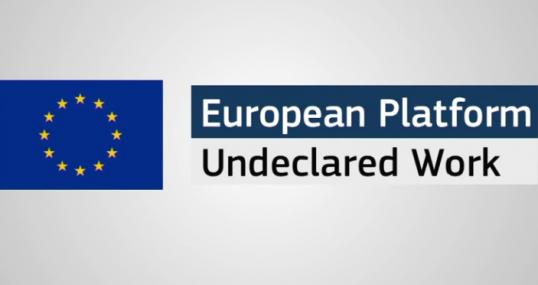What exactly is undeclared work?
Undeclared work is any work that is lawful by nature but not declared to the relevant public authorities. It’s often known informally as ‘cash-in-hand work’ and is common in sectors such as construction, cleaning, childcare, and food and hospitality.
What does the ‘European Platform tackling undeclared work’ do?
Combating the issue of undeclared work is a priority of the EU, which is why it launched the ‘European Platform tackling undeclared work’ back in 2016.
The platform brings together organisations from around the EU, including labour, tax and social security authorities, to cooperate across borders and exchange information, knowledge and good practices.
Its main objectives are to transform undeclared work into declared work and make job markets and welfare systems fair and efficient. This will promote better living and working conditions for citizens all over the EU.
Why do we need to tackle undeclared work?
Being paid cash in hand or doing work ‘on the side’ may seem harmless or feel like the only option in a difficult job market. However, it can have big implications and disadvantages for workers.
If you are involved in undeclared work, you may experience:
- low pay (often below the statutory minimum wage);
- excessive or irregular working hours;
- poor or unsafe working conditions and low quality of work;
- a lack of employment rights, such as to holiday and sick pay;
- a lack of access to pensions and unemployment benefits;
- less job security and fewer opportunities to upskill or find a formal job.
I may be involved in undeclared work. What should I do?
If you’re concerned that you’re involved in undeclared work, you can find out the laws in your country and check whether you and your employer are compliant on the platform’s website.
If you think that your employer or another organisation is involved in undeclared work, you can also find out how to report this to the relevant authorities.
All you have to do is select your country from the drop-down list, where you will find the websites and phone numbers of your national contact points.
Is it my responsibility to take action?
The EU’s motto is that ‘undeclared work is everybody’s problem’. This is because undeclared work means unpaid tax, which means a lack of funding for essential public services such as unemployment, health and pension systems. This has a knock-on effect on all members of society, particularly those who are most vulnerable.
As a citizen, you can help to put an end to undeclared work by reporting it. You can also seek advice on how you can make the step from undeclared work into formal employment.
Of course, preventing undeclared work is not solely the responsibility of workers – it requires a common effort. It is essential that employers comply with national regulations. Meanwhile, the EU is supporting individual Member States to take action at governmental level.
Where can I find out more?
To find out more about the platform, watch this video or visit the platform’s web page. To find more information, subscribe to the regular newsletter on undeclared work, or make use of the page’s library of helpful resources.
Related links:
National tools for reporting undeclared work
European Platform tackling undeclared work – Video (YouTube)
Read more:
Living and Working Conditions in EURES countries
EURES Jobs Database
EURES services for employers
EURES Events Calendar
Upcoming Online Events
EURES on Facebook
EURES on Twitter
EURES on LinkedIn
Details
- Publication date
- 16 November 2018
- Authors
- European Labour Authority | Directorate-General for Employment, Social Affairs and Inclusion
- Topics
- External EURES news
- Youth
- Related section(s)
- Sector
- Accomodation and food service activities
- Activities of extraterritorial organisations and bodies
- Activities of households as employers, undifferentiated goods- and services
- Administrative and support service activities
- Agriculture, forestry and fishing
- Arts, entertainment and recreation
- Construction
- Education
- Electricity, gas, steam and air conditioning supply
- Financial and insurance activities
- Human health and social work activities
- Information and communication
- Manufacturing
- Mining and quarrying
- Other service activities
- Professional, scientific and technical activities
- Public administration and defence; compulsory social security
- Real estate activities
- Transportation and storage
- Water supply, sewerage, waste management and remediation activities
- Wholesale and retail trade; repair of motor vehicles and motorcycles
